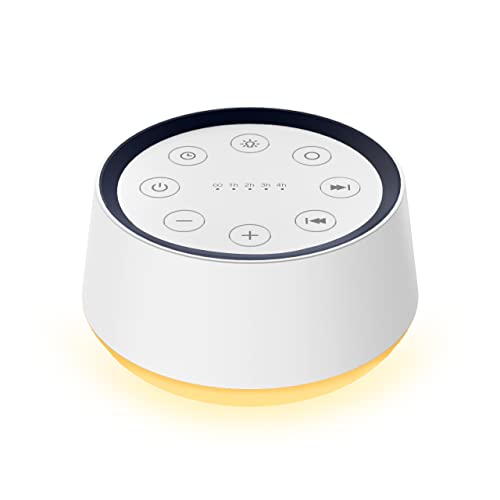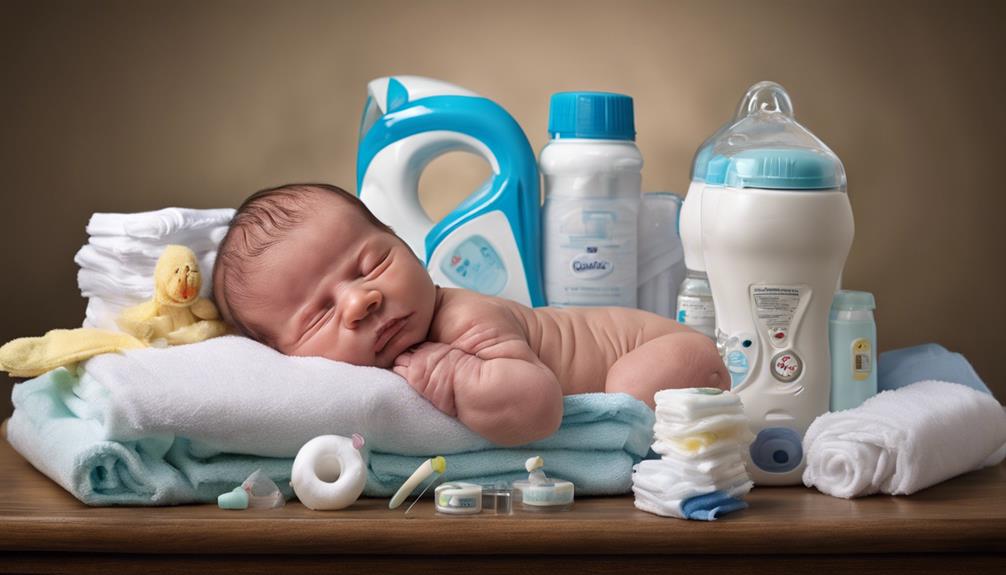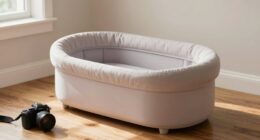As novice parents embarking on the journey of newborn care, it’s essential for us to arm ourselves with the necessary tools, just as an experienced gardener would when prepping their soil prior to planting seeds.
These essential newborn care essentials are the foundation upon which we build our nurturing sanctuary for our little one. By ensuring we have these seven key items in our possession, we not only provide for our baby's basic needs but also create a cocoon of safety and comfort where they can thrive.
Stay tuned to uncover the secrets to a smooth and secure journey into parenthood.
Key Takeaways
- Proper feeding practices like breastfeeding and burping are essential for newborn growth and comfort.
- Effective diapering techniques, using wipes and cream, ensure hygiene and prevent diaper rash.
- Safe sleep practices, including back sleeping and a calming bedtime routine, promote restful nights for newborns.
- Essential baby care and bathing practices, like gentle cleaning and diaper cream application, maintain baby health and hygiene.

NCVI Electric Breast Pump 8782, Portable Hospital-Grade Double Pump with 4 Modes & 9 Levels, Anti-Backflow, Rechargeable Quiet Breastfeeding Pump for Efficient Comfortable Use at Home, Work or Travel
MODES AND STIMULATION 📳: NCVI electric breast pumps for women comes with 4 modes and 9 levels. The…
As an affiliate, we earn on qualifying purchases.
As an affiliate, we earn on qualifying purchases.
Feeding Your Baby
Feeding your newborn is an important aspect of their care, ensuring they receive the essential nutrients and antibodies necessary for their growth and development. Breast milk is highly recommended for its numerous benefits, providing your baby with important antibodies and nutrients that formula mightn't offer. Proper latching is critical during breastfeeding; it not only ensures that your baby gets enough milk but also helps prevent nipple soreness, making the experience more comfortable for you.
Newborns typically feed every 2-3 hours, establishing a nurturing bond between you and your little one. Remember to burp your baby after feeding to release any swallowed air, reducing discomfort and minimizing spit-up incidents. Having a breast pump can be beneficial for expressing breast milk, allowing you to store it for later use. When considering formula options, consult healthcare providers for guidance on types and brands that best suit your baby's needs. Your healthcare team is there to support you in making informed decisions about feeding your precious newborn.

Desitin Maximum Strength Baby Diaper Rash Cream, 40% Zinc Oxide, Hypoallergenic No Added Parabens & Dyes, Protects & Relieves Baby’s Skin for Up to 12 Hours, Prevents Diaper Rash, 4.8 oz Tube
Maximum Strength Diaper Rash Cream: Desitin diaper cream contains 40% zinc oxide to treat and prevent diaper rash…
As an affiliate, we earn on qualifying purchases.
As an affiliate, we earn on qualifying purchases.
Diapering Duties
Let's talk about the vital diapering duties when caring for your newborn. From proper changing techniques to using diapering essentials like wipes and cream, these practices are essential for your baby's comfort and hygiene.
Preventing diaper rash is a top priority, so we'll cover tips on how to keep your baby's delicate skin protected and healthy.
Changing Techniques
When changing your newborn's diaper, remember to always wipe gently from front to back to prevent infections and irritation. Proper diapering techniques are essential to keep your baby comfortable and healthy.
Here are some tips to help you master this task:
- Apply diaper cream when necessary to protect your baby's delicate skin from diaper rash.
- Maintain hygiene by washing your hands before and after each diaper change to prevent the spread of germs.
- Diaper your baby about 10 times a day to guarantee they stay clean and comfortable.
Diapering Essentials
To effectively fulfill your diapering duties for your newborn, make sure you have all the necessary supplies ready at the designated changing area.
When it comes to diaper changes, having diapers that fit well to prevent leaks and guarantee comfort is essential. Additionally, gentle wipes specifically designed for babies help maintain hygiene without harming the baby's skin.
Don't forget the diaper rash cream; it acts as a protective barrier, shielding your baby's delicate skin from irritation and discomfort.
Creating a well-equipped changing area with all your diapering supplies close at hand can make the process smoother for both you and your baby. Prioritizing these diapering essentials is vital for efficient and hygienic newborn care.
Preventing Diaper Rash
Changing diapers frequently, using gentle wipes, and allowing the baby's skin to air out are key practices in preventing diaper rash for your newborn.
To prevent diaper rash effectively, consider the following:
- Use a barrier cream: Apply a protective layer between the diaper and your baby's skin to reduce the risk of diaper rash.
- Keep the diaper area clean and dry: Make sure to clean thoroughly after each diaper change, especially after bowel movements to prevent diaper rash.
- Choose natural fiber diapers: Opt for breathable materials to avoid irritation and promote airflow, helping to prevent diaper rash in your baby's delicate skin.

Brown Noise Sound Machine with 30 Soothing Sounds 12 Colors Night Light White Noise Machine for Adults Baby Kids Sleep Machines Memory Function 36 Volume Levels 5 Timers for Home Office Travel
❤[30 Natural and Soothing Sounds] Our white noise machine provides 30 soothing sounds, including 3 Brown noise, 2…
As an affiliate, we earn on qualifying purchases.
As an affiliate, we earn on qualifying purchases.
Sleepytime Strategies

Let's talk about essential strategies to help your newborn get the best possible sleep.
Safe sleep practices, such as always placing your baby on their back, are vital to reduce the risk of SIDS.
Establishing a bedtime routine and mastering swaddling techniques can also make a significant difference in your baby's sleep patterns.
Safe Sleep Practices
When it comes to newborn care essentials, prioritizing safe sleep practices is important for promoting your baby's well-being and reducing the risk of Sudden Infant Death Syndrome (SIDS).
To make sure your baby sleeps safely, remember the following tips:
- Always place your baby on their back to sleep.
- Avoid using soft bedding, pillows, quilts, or stuffed animals in the crib.
- Keep the baby's sleep area free from hazards and maintain a comfortable room temperature.
Bedtime Routine Tips
To guarantee your baby's bedtime routine promotes restful sleep, incorporating calming activities and a soothing environment can help set the stage for a peaceful night's rest. Establish a consistent bedtime routine by including relaxing activities like a warm bath, gentle massage, or soothing lullabies.
Create a tranquil atmosphere in the nursery with dim lighting, soft music, and a comfortable sleep space to promote relaxation. Maintain predictability by following the same sequence of activities each night, signaling to your baby that it's time to sleep.
Avoid stimulating activities or screens close to bedtime, as these can hinder your baby's ability to wind down and prepare for sleep. Stick to these bedtime routine tips for a more peaceful and restful night for both you and your little one.
Swaddling Techniques
Swaddling newborns is a technique that helps them feel secure and mimics the cozy environment of the womb, promoting better sleep. When swaddling your baby, remember these key points:
- Prevent Startle Reflex: Proper swaddling can prevent the startle reflex, which can disrupt sleep.
- Soothe Fussy Babies: Swaddling can help soothe fussy babies and reduce crying episodes.
- Guarantee Healthy Hip Development: It's important to guarantee the swaddle is snug but not too tight to allow for healthy hip development.

Cetaphil Baby Wash & Shampoo, 13.5oz Pack of 2, Hypoallergenic, Gentle Enough for Everyday Use, Soap Free
You will receive (2) bottles of 13.5oz Baby Body Wash & Shampoo by Cetaphil
As an affiliate, we earn on qualifying purchases.
As an affiliate, we earn on qualifying purchases.
Bathing and Beyond

With newborn care, ensuring proper bathing practices from the start is essential for the baby's well-being and hygiene. Bathing your newborn 2-3 times a week using gentle baby soap is important for maintaining cleanliness while also preserving the skin's natural moisture. Remember to support your baby's delicate head and neck during baths to prevent any potential injuries. After the bath, gently patting your baby dry helps to avoid irritation and keeps their skin soft and healthy.
One important aspect of newborn care during bathing is ensuring the cleanliness and dryness of the umbilical cord stump until it naturally falls off. This practice is crucial for preventing infections. Avoid submerging the umbilical cord stump in water to aid in its healing process and reduce the risk of complications. By following these bathing practices and caring for the umbilical cord stump diligently, you're taking significant steps in safeguarding your newborn's health and well-being.
Bonding and Soothing Secrets

Ensuring a strong emotional bond and promoting relaxation for your newborn involves engaging in skin-to-skin contact and gentle soothing techniques. When it comes to bonding and soothing your little one, here are some secrets to help you create a nurturing environment:
- Cradling and Gentle Stroking: By cradling your baby in your arms and gently stroking their skin, you can strengthen the emotional connection between you and your newborn.
- Massage Techniques: Using massage techniques not only aids in relaxation but also promotes growth and development for your baby.
- Vocal Sounds and Swaddling: Incorporating soothing vocal sounds, music, and gentle movements can help comfort your baby. Additionally, swaddling your newborn can provide a sense of security and comfort, leading to better sleep and relaxation.
Safety Savvy Tips

To keep your newborn safe and sound during sleep, always remember to place them on their back to reduce the risk of Sudden Infant Death Syndrome (SIDS).
When setting up your baby's sleep environment, it's important to prioritize safety. Opt for a firm crib mattress that fits snugly within the crib frame to prevent entrapment. Avoid using soft bedding, pillows, or blankets to reduce the risk of suffocation hazards. Remember to keep the crib free of any potential strangulation risks such as cords or wires. Regularly inspect the crib and surrounding area for any safety concerns to make sure a secure sleeping space for your little one.
In addition to sleep safety, other essential items to take into account for your newborn include a changing pad for easy diaper changes, burp cloths to handle spit-ups, a bottle warmer for feeding convenience, and a hooded towel for bath time. Proper umbilical cord care and a reliable diaper pail are also must-haves on your newborn checklist.
Lastly, always prioritize car seat safety by making sure it's installed correctly and meets all safety standards. Your baby's well-being is our top priority.
New Parent Advice

As new parents, managing the challenges of caring for a newborn can be overwhelming, but seeking support and creating a routine can help ease the shift into parenthood. Here's some valuable advice to help navigate this exciting yet demanding journey:
- Connect with Other Parents: Joining parenting groups or seeking advice from experienced family and friends can provide reassurance, practical tips, and a sense of community during this transformative time.
- Prioritize Self-Care: Remember to take care of yourself physically and emotionally. Your well-being is essential for providing the best care for your newborn. Don't hesitate to ask for help when needed.
- Communicate Openly: Establishing open communication with your partner about responsibilities, concerns, and feelings can strengthen your bond and make the parenting experience more harmonious.
Frequently Asked Questions
What Essentials Should I Buy for My Newborn?
We believe it's important to have nursery essentials like a crib, bedding, and night-light for your newborn. Feeding items such as burp cloths, bibs, and a breast pump are also essential. Diapers, wipes, and diaper rash cream are must-haves.
What Week Is Hardest With Newborn?
The first week with a newborn can be the toughest. We felt overwhelmed by sleepless nights and constant care. Seeking help from loved ones and professionals made a world of difference in managing those challenging early days.
What Are the 4 Essentials of Newborn Care?
We'll share the 4 essentials of newborn care, featuring feeding, diapering, clothing, and bathtime. Ensuring bibs, diapers, onesies, and a tub are necessary. These basics will help new parents handle their precious bundle with care.
What Parents of Newborns Need?
We comprehend the overwhelming needs of newborn parents. From feeding supplies to diapering, clothing, bedtime essentials, and safety gear, let's navigate this journey together with the essentials you need.
Conclusion
To sum up, as new parents, we must prioritize feeding, diapering, sleep, bathing, bonding, safety, and seeking advice.
By having these crucial newborn care essentials on hand, we can make sure that our little one receives the best care possible.
Remember, being prepared with these essentials will make the change into parenthood smoother and more fulfilling.
So let's embrace this new journey with confidence and love, knowing that we've everything we need to care for our precious newborn.









